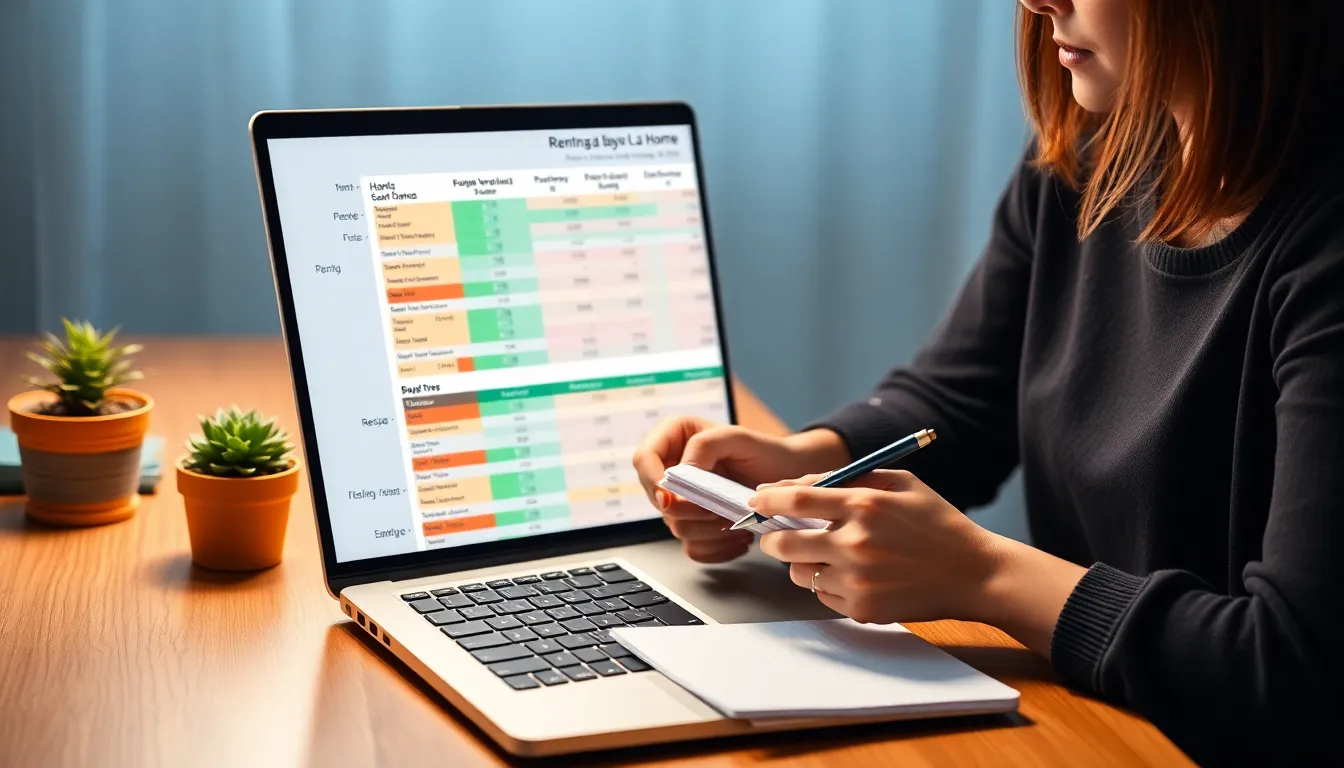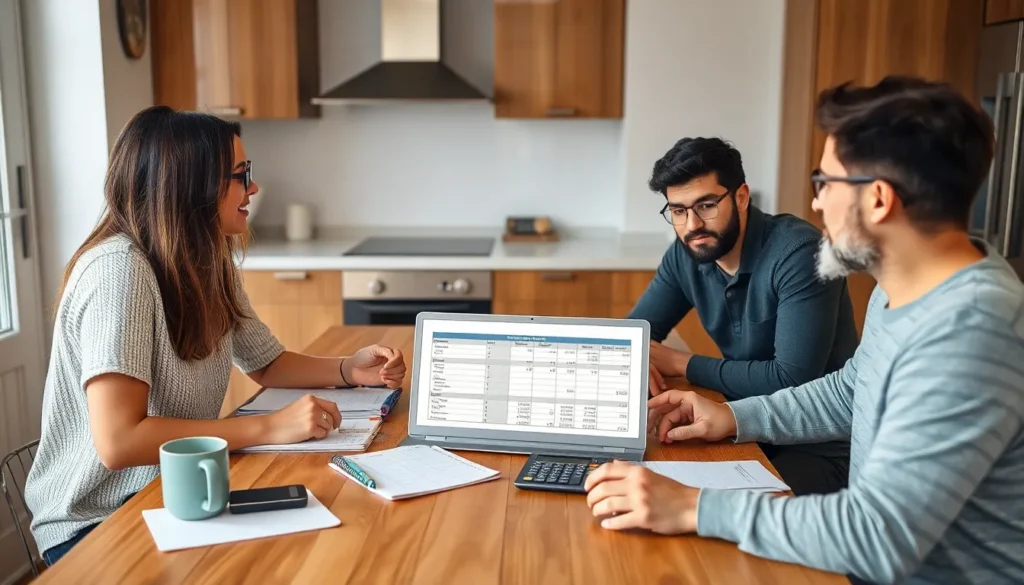Table of Contents
ToggleDeciding between renting and buying a home can feel like choosing between a cozy blanket and a fancy cashmere sweater. Both have their perks, but only one will leave your wallet feeling a little lighter. Enter the renting vs buying analysis spreadsheet—a savvy tool that turns your housing dilemma into a clear-cut decision.
With this spreadsheet, you can crunch the numbers and see exactly how much that charming rental or dream home will cost you over time. It’s like having a financial advisor in your pocket, minus the hefty fees and awkward small talk. Whether you’re a free-spirited renter or a hopeful homeowner, this analysis helps you weigh the pros and cons. Get ready to discover which option suits your lifestyle best and maybe even have a chuckle or two along the way.
Overview of Renting vs Buying
The choice between renting and buying impacts financial well-being. Renting often provides flexibility, allowing individuals to relocate without the burden of selling a property. Many renters avoid property maintenance costs, as landlords typically handle repairs and upkeep.
Buying a home offers stability. Homeownership creates equity, which can appreciate over time, contributing to wealth accumulation. Monthly mortgage payments often serve as an investment, gradually building ownership in the property.
Financial aspects must be evaluated in detail. The renting vs buying analysis spreadsheet calculates potential long-term costs for each option. Users input variables like location, property value, and market trends to obtain tailored insights.
Consider the initial expenses involved. Renting usually requires a security deposit and first month’s rent. In contrast, buying a home involves a down payment, closing costs, and potential renovation expenses, which can significantly impact the initial investment.
Long-term implications deserve attention. Rent payments may increase annually, while fixed-rate mortgages allow for predictable monthly costs. Homeowners also benefit from potential tax deductions related to mortgage interest and property taxes.
The decision-making process involves evaluating lifestyle needs, financial goals, and market conditions. Factors such as family size, job stability, and local housing market trends influence whether renting or buying aligns better with personal circumstances.
Utilizing the spreadsheet, individuals can visualize various scenarios, aiding in informed decision-making. Prioritizing one’s goals in relation to budgeting and lifestyle significantly contributes to choosing the right option between renting and buying.
Key Features of the Spreadsheet

The renting vs buying analysis spreadsheet offers essential functionalities for informed decision-making. It facilitates detailed comparisons of financial outcomes for both renting and purchasing a home.
Data Inputs Required
Users must enter specific data points for accurate results. These include rental costs, home prices, and down payment amounts. Location factors also play a significant role, influencing both property prices and rent rates. Monthly expenses, such as utilities and maintenance fees, need inclusion, along with anticipated appreciation rates for property values. This comprehensive input collection ensures that all relevant financial aspects are considered in the analysis.
Calculation Methods Used
The spreadsheet employs various calculation methods to present clear insights. Cost breakdowns include initial expenses, recurring monthly payments, and long-term projections. It accounts for trends in pricing for homes and rentals, applying formulas for appreciation and mortgage interest. The tool projects total costs over a defined period, allowing users to visualize differences clearly between renting and buying. Users gain an in-depth understanding as they compare net gains, equity build-up, and the potential for tax benefits related to homeownership.
Advantages of Renting
Renting a home offers several distinct benefits that cater to various lifestyles and financial situations.
Flexibility and Mobility
Flexibility ranks as one of the primary advantages of renting. Renters can relocate easily, responding to changing job situations or personal preferences without the burden of selling a property. Short-term leases allow individuals to test new neighborhoods or cities without long-term commitment. Additionally, renters often enjoy access to amenities, like pools or gyms, that may not be affordable in a purchased home. Mobility also means that renters can adapt more quickly to life changes, such as starting a family or pursuing education, making it a practical choice for many.
Lower Upfront Costs
Lower upfront costs significantly benefit those who choose to rent. Typically, renting requires only a security deposit and first month’s rent, whereas buying includes hefty expenses like a down payment and closing costs. Savings from these costs allow renters to invest in other areas, such as career growth or travel. Maintenance responsibilities usually fall to landlords, minimizing unexpected financial burdens. Cash flow remains flexible, enabling renters to allocate resources toward experiences, hobbies, or savings rather than fixing a home. Overall, renting presents an affordable pathway to secure living arrangements without substantial financial pressure.
Advantages of Buying
Buying a home offers numerous benefits, particularly in financial growth and stability.
Equity Building
Equity building represents a significant advantage of homeownership. When homeowners make mortgage payments, they gradually increase their equity in the property. Each payment reduces the loan balance while property values typically rise over time. With appreciation, homeowners often experience substantial financial growth. For instance, a home bought at $300,000 may appreciate to $400,000 within a decade, leading to $100,000 in equity accumulation. Homeowners can leverage this equity for future investments or financial goals. Unlike renting, which provides no return beyond monthly payments, owning a home creates long-term financial benefits.
Stability and Control
Stability and control are other key advantages of buying a home. Homeownership secures a permanent residence free from the uncertainties of rental agreements. Fixed-rate mortgages offer predictable monthly payments, protecting homeowners from rising rents. Stability in housing enables individuals to build roots in their communities, fostering a sense of belonging. Additionally, homeowners possess the autonomy to customize their living spaces without landlord restrictions. Control over property improvements enhances personal satisfaction and increases the home’s value. Ultimately, the stability of homeownership contributes to long-term peace of mind.
Comparing the Costs
Evaluating the costs of renting versus buying helps individuals make informed decisions. A detailed breakdown reveals essential differences in monthly expenses and long-term benefits.
Monthly Expenses Breakdown
Renters typically face fixed monthly payments, which usually include rent and utilities. Examples of recurring costs include renters insurance, which can cost $15 to $30 per month. In contrast, homeowners contribute mortgage payments, property taxes, homeowner’s insurance, and maintenance costs, creating a more diverse financial commitment. For instance, homeowners might allocate $1,500 monthly for mortgage payments, plus an additional $200 for property taxes. Understanding these expenses assists in planning budgets and forecasts for the future.
Long-Term Investment Potential
Homeownership offers significant long-term investment opportunities, primarily through equity building. A home valued at $300,000 that appreciates to $400,000 over ten years results in $100,000 equity growth. This appreciation contrasts sharply with renting, where monthly payments contribute nothing to ownership. Homeowners also gain potential tax benefits, such as mortgage interest deductions, further enhancing financial returns. An investment in property not only secures a place to live but also positions individuals for future financial stability and wealth accumulation.
Deciding between renting and buying a home is a significant choice that impacts financial stability and lifestyle. The renting vs buying analysis spreadsheet simplifies this process by providing tailored insights into long-term costs and benefits. It empowers individuals to weigh their options effectively based on personal circumstances and market conditions.
By using this tool, users can visualize the financial implications of each choice and make informed decisions that align with their goals. Whether one values flexibility or seeks the stability of homeownership, the spreadsheet serves as an essential resource in navigating this complex dilemma. Ultimately, understanding the nuances of both renting and buying can lead to a more satisfying and financially sound living situation.







